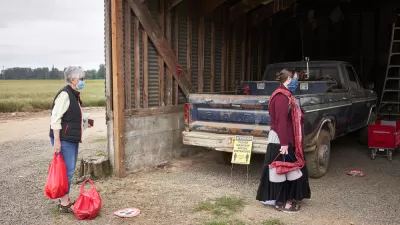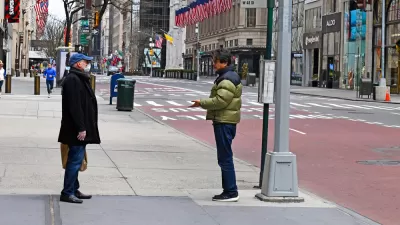Many planning policies, like zoning rules and parking minimums, undermine traditional "Main Street"-style development and, in fact, make the Strong Towns ethos more palatable to Libertarians.
In this post from Strong Towns Blog, Andrew Burleson describes how he finds common ground with Libertarians when he is explaining the Strong Towns message. This is the second in a series of articles on understanding the political languages that different groups find compelling.
"Libertarians tend to have mixed reactions to the Strong Towns Message. On the one hand, true libertarians are naturally skeptical of big government and big business, and not terribly shocked by the financial data we're sharing. It isn't hard for them to imagine that unwise government spending and the big business that capitalizes on it have created an economic Ponzi scheme. The idea that towns should focus on local productivity tends to go over pretty easily as well."
"I find most Libertarians see the development pattern primarily as a lifestyle choice, which therefore means it represents the outcome of 'freedom', which would mean a different development pattern is a form of 'coercion.' Where I have found the biggest breakthrough is talking through the countless forms of coercion that have been used to bring about our current development pattern, much of which the public at large is not aware of."
FULL STORY: Strong Towns for Libertarians

Planetizen Federal Action Tracker
A weekly monitor of how Trump’s orders and actions are impacting planners and planning in America.

Restaurant Patios Were a Pandemic Win — Why Were They so Hard to Keep?
Social distancing requirements and changes in travel patterns prompted cities to pilot new uses for street and sidewalk space. Then it got complicated.

Maui's Vacation Rental Debate Turns Ugly
Verbal attacks, misinformation campaigns and fistfights plague a high-stakes debate to convert thousands of vacation rentals into long-term housing.

In California Battle of Housing vs. Environment, Housing Just Won
A new state law significantly limits the power of CEQA, an environmental review law that served as a powerful tool for blocking new development.

Boulder Eliminates Parking Minimums Citywide
Officials estimate the cost of building a single underground parking space at up to $100,000.

Orange County, Florida Adopts Largest US “Sprawl Repair” Code
The ‘Orange Code’ seeks to rectify decades of sprawl-inducing, car-oriented development.
Urban Design for Planners 1: Software Tools
This six-course series explores essential urban design concepts using open source software and equips planners with the tools they need to participate fully in the urban design process.
Planning for Universal Design
Learn the tools for implementing Universal Design in planning regulations.
Heyer Gruel & Associates PA
JM Goldson LLC
Custer County Colorado
City of Camden Redevelopment Agency
City of Astoria
Transportation Research & Education Center (TREC) at Portland State University
Jefferson Parish Government
Camden Redevelopment Agency
City of Claremont





























